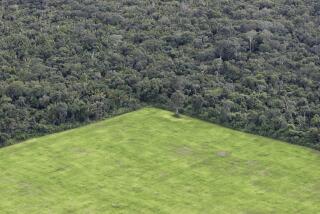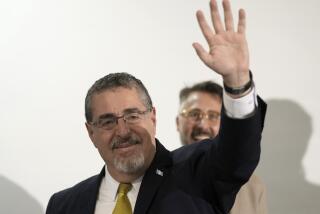Officials to Monitor Latin Accord Named
- Share via
CARACAS, Venezuela — The foreign ministers of 13 Latin American countries agreed Saturday to the formal makeup of a commission to monitor compliance with a peace pact signed earlier this month by the presidents of the five Central American nations.
The International Verification Commission, as it is called, will include the secretaries general of the United Nations and the Organization of American States.
Meeting here, representatives of all of the parties agreed swiftly on the makeup of the commission in a show of Latin American unity that diplomats said is meant to send a message to Washington to give the peace plan a chance.
The foreign ministers of the five signatory nations--Guatemala, El Salvador, Honduras, Nicaragua and Costa Rica--will be members of the commission, as will their counterparts from Mexico, Colombia, Panama, Venezuela, Argentina, Brazil, Peru and Uruguay.
Mexico, Colombia, Panama and Venezuela make up the Contadora Group of nations that has been pressing a peace initiative in Central America for more than four years. The other four joined the process in 1985 as the Contadora support group.
‘Backbone’ for Peace Effort
“The (verification) commission is the backbone of the success of this peace effort,” said El Salvador’s Foreign Minister Ricardo Acevedo Peralta. “Without this commission, it would be very difficult to prove compliance with the commitments that we have made.”
The foreign ministers, however, were unable to agree immediately on how much power to grant the commission and left that difficult task to an ad hoc technical group. The Central American foreign ministers are scheduled to meet in Managua in September, and the technical group will meet there at the same time.
The foreign ministers agreed to form an emergency economic assistance fund for Central America and to try to raise money for the fund from other countries. They said they would promote the peace plan internationally, and they indirectly urged the United States to end its aid to the Nicaraguan contras.
They urged “countries with links and interests in the region to put an end to all actions contrary to the execution of the accord.”
In a show of continued concern about the peace accord by the Reagan Administration, Otto J. Reich, the American ambassador to Venezuela, came to the meeting site Saturday morning, asking to see Guatemala’s foreign minister, Alfonso Cabrera, according to a Guatemalan official. Cabrera declined to leave the meeting to see Reich and, instead, sent him a message saying that “what we (the Latin Americans) are looking for is an independence policy,” the official added.
Compliance Questioned
Administration officials have said they do not believe Nicaragua’s Sandinista government will comply with terms of the accord, which, among other things, would require substantial moves toward more democratic internal politics by the Managua government. Reagan aides have indicated that they will ask Congress for money to assist the anti-Sandinista contras beyond Nov. 7, the target date under the peace plan for cease-fires in all Central American conflicts and an end to external aid to guerrillas fighting there.
Some Latin American diplomats have expressed concern that the United States may try to stymie the peace accord through pressure on its allies in the region. At a meeting of the five Central American foreign ministers held last week in El Salvador to begin work on complicated details of implementing the peace accord, diplomats said that Honduras, a close ally of the United States, hindered the group’s progress.
Besides cease-fires in ongoing guerrilla insurgencies in Nicaragua, El Salvador and Guatemala, the peace plan calls for a number of simultaneous developments, including amnesties for rebels that lay down their arms, freedom of the press and other democratic measures, as well as an end to support by one country for guerrilla groups operating in another.
The verification commission will oversee progress on each point and will also try to mediate a mutual arms reduction accord among the Central American nations. The foreign ministers meeting here, however, did not get into the arms issue, which proved in the past to be a major stumbling block in the Contadora Group’s initiative.
Named for Panama Island
Contadora took its name from a Panamanian island where the group first met in January, 1983, to begin trying to find a settlement to Central America’s conflicts through diplomatic mediation.
A Nicaraguan diplomat here said that backing from the Contadora countries is needed in the current peace process “as an instrument of pressure on the five Central American countries.”
The diplomat said that, contrary to Reagan Administration forecasts, Nicaragua’s plans conform to those called for by the Central American peace plan.
More to Read
Sign up for Essential California
The most important California stories and recommendations in your inbox every morning.
You may occasionally receive promotional content from the Los Angeles Times.









